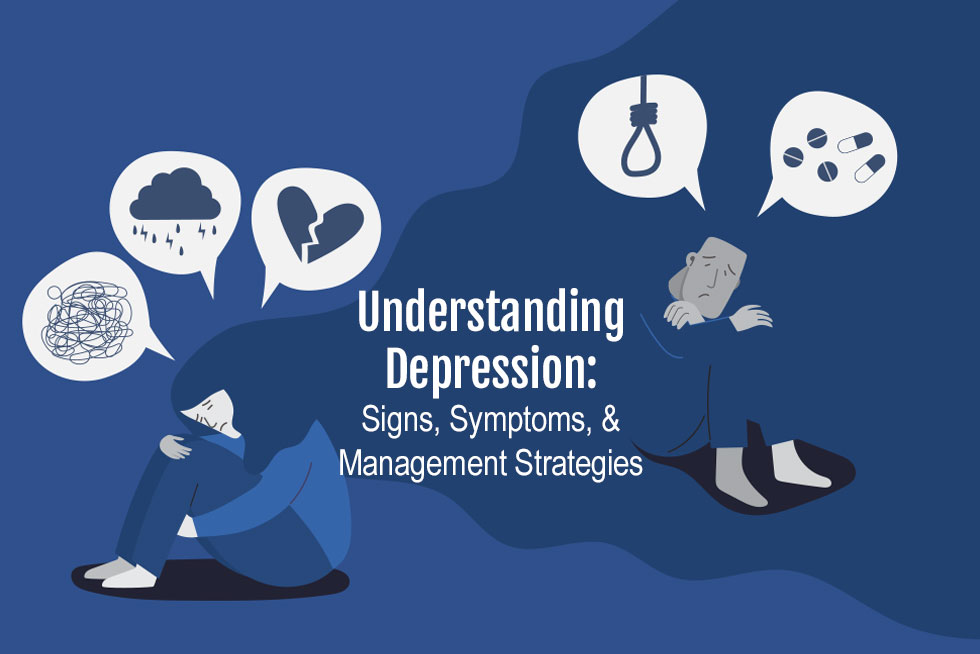Depression is a common yet serious mental health condition that affects millions of people worldwide. It can significantly impact one’s quality of life and ability to function. This article explores the signs and symptoms of depression, pharmacologic and non-pharmacologic management strategies, and the role of continuing professional development in aiding healthcare workers to better support people presenting with depression or depressive symptoms.
Signs and Symptoms of Depression
Depression manifests through a variety of signs and symptoms, which can vary in severity and duration. Recognizing these symptoms is crucial for timely intervention and effective management. Common signs and symptoms include:
- Persistent Sadness or Low Mood: Feeling sad or empty most of the day, nearly every day.
- Loss of Interest or Pleasure: Losing interest in activities once enjoyed, including hobbies and social interactions.
- Changes in Appetite or Weight: Significant weight loss or gain, or changes in appetite.
- Sleep Disturbances: Insomnia or excessive sleeping.
- Fatigue or Low Energy: Feeling tired and lacking energy even with adequate rest.
- Difficulty Concentrating: Trouble focusing, making decisions, or remembering information.
- Feelings of Worthlessness or Guilt: Excessive or inappropriate guilt and feelings of worthlessness.
- Physical Symptoms: Unexplained aches and pains, headaches, or digestive problems.
- Thoughts of Death or Suicide: Recurrent thoughts of death, suicidal ideation, or suicide attempts.
Pharmacologic Management of Depression
Pharmacologic treatments for depression primarily involve the use of antidepressant medications. These medications aim to correct chemical imbalances in the brain that contribute to depressive symptoms. Common classes of antidepressants include:
- Selective Serotonin Reuptake Inhibitors (SSRIs): Such as fluoxetine, sertraline, and citalopram. SSRIs are often the first line of treatment due to their effectiveness and relatively mild side effects.
- Serotonin-Norepinephrine Reuptake Inhibitors (SNRIs): Including venlafaxine and duloxetine. SNRIs can be effective for patients who do not respond to SSRIs.
- Tricyclic Antidepressants (TCAs): Such as amitriptyline and nortriptyline. TCAs are effective but often reserved for treatment-resistant cases due to their side effect profile.
- Monoamine Oxidase Inhibitors (MAOIs): Including phenelzine and tranylcypromine. MAOIs are rarely used due to dietary restrictions and potential side effects but can be effective for certain patients.
- Atypical Antidepressants: Such as bupropion and mirtazapine, which work differently from other antidepressants and may be suitable for patients with specific needs.
Non-Pharmacologic Management of Depression
Non-pharmacologic approaches to managing depression are essential and often used in combination with medication. These strategies include:
- Psychotherapy: Cognitive-behavioral therapy (CBT), interpersonal therapy (IPT), and other forms of counseling can help patients understand and change negative thought patterns and behaviors.
- Lifestyle Modifications: Regular physical activity, a balanced diet, adequate sleep, and stress reduction techniques such as mindfulness and meditation can improve mood and overall well-being.
- Support Groups: Joining support groups or participating in group therapy can provide social support and reduce feelings of isolation.
- Electroconvulsive Therapy (ECT): ECT may be considered for severe depression that does not respond to other treatments. It involves electrical stimulation of the brain under anesthesia.
- Light Therapy: Particularly useful for seasonal affective disorder (SAD), light therapy involves exposure to bright light to regulate mood and sleep patterns.
The Role of Continuing Professional Development (CPD) in Managing Depression
Continuing professional development is crucial for healthcare workers to stay informed about the latest research, treatment modalities, and best practices in managing depression. CPD can assist healthcare workers in several ways:
- Enhanced Knowledge and Skills: Regular training and education on depression and its management enable healthcare workers to provide high-quality care. This includes understanding the latest pharmacologic and non-pharmacologic treatments.
- Early Identification and Intervention: CPD programs can help healthcare workers recognize the early signs of depression and intervene promptly, improving patient outcomes.
- Improved Communication: Training in communication skills can aid healthcare workers in discussing sensitive topics with patients, such as mental health and treatment adherence.
- Holistic Care: CPD emphasizes a holistic approach to care, integrating physical, psychological, and social aspects of health, which is essential for managing depression.
- Self-Care for Healthcare Workers: CPD can also address the mental health needs of healthcare workers themselves, providing strategies to manage stress and prevent burnout, thereby enhancing their ability to care for patients.
Depression is a multifaceted condition requiring a comprehensive approach to management. Recognizing the signs and symptoms, utilizing pharmacologic and non-pharmacologic treatments, and engaging in continuing professional development are all critical components in effectively supporting patients with depression. By staying informed and proactive, healthcare workers can make a significant difference in the lives of those affected by this challenging condition.
Author: Jennifer Walker, RN, MSN, NPD-BC, GERO-BC, NE-BC



